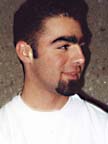Get involved! (No really, you’ll like it!)
We should all be involved in making the world a better place—and here are profiles of three young people who have made a difference. Ana Fernandez fought to have construction finished on Belmont HS. Ardashes Kasskhian went from a campaign volunteer to campaign director. Areen Ibanosian organized an art exhibit to commemorate the Armenian Genocide.
I have a new crusade—politics. Don’t tell me you don’t care. You’ll get me started. I’ll be like the telemarketer you can’t hang up on.
Recently I was at a coffee shop with my friends Ranil and George. I started harassing them about politics. Were they going to vote? No. Their vote didn’t matter. It didn’t matter who was elected president.
"I am not a citizen," muttered George under his breath. "Neither am I," said Ranil. At that point my friends would have stuffed a sock in my mouth to shut me up.
I wanted to tell them off. I wanted to tell them that it didn’t matter whether they were citizens or even whether they are old enough to vote. The point is that we should all be involved in our communities and schools and we should all try to fix the things that aren’t working.
But I can’t blame my friends for not wanting to vote. Even my own mother feels the same way. I tried to explain to her about the Supreme Court. During the next four years, three of the nine Supreme Court judges are going to come up for retirement. That’s what makes this year’s race important: our next president will serve for four years, possibly eight, but the Supreme Court judges he appoints will serve until they decide to retire.
My mom’s eyes were glazing over as I tried to explain why I hope Gore wins in November. He will appoint middle-of-the-road judges who will support all sorts of things that I believe are basic human rights—abortion rights, gay and lesbian marriages and equal rights. Bush has said that he will appoint conservative judges. Right now, the Supreme Court is one vote away from overturning Roe v. Wade, the Supreme Court case that made abortion legal. With more conservative judges, the Supreme Court may overturn Roe v. Wade.
But after I had explained all of this very convincingly, my mom said that our votes don’t matter because the outcome is already decided. Augh! My own mother. She’s just as cynical and uninterested as most voters—how can this be?
I don’t know exactly how I came out like this. Maybe it started last February, when I volunteered for Paul Krekorian, a Democratic State Assembly candidate for the Glendale area. Although I was really busy and could only help a few hours a week, I loved volunteering at his office. I would usually get there around 7 after work, exhausted. But the energy of the place always seemed to engulf me—the teenagers running in and out with signs and planks, people looking for free phones to make calls. I stuffed envelopes, called people to convince them to vote for Krekorian, and even walked in some neighborhoods to tell Armenian voters about him. And although Krekorian lost, I am proud that I in some small way contributed.
But I am not naive either. I know that our system of democracy isn’t perfect and that good doesn’t always win over evil. For example, I am outraged that Dick Cheney, the man who might be our next Vice President, voted against government-sponsored student loans and the Equal Rights Amendment, which promised women equality. I can’t believe that both Gore and Bush have failed to address teens and the issues that concern us.
This is exactly why we can’t turn our backs on politics. I spent an afternoon among the protesters outside the Democratic National Convention last month, and saw thousands of young people, trying to be heard. It was so exciting to see people who care and are doing something about it. I think the trick is to mobilize the people who don’t care, who didn’t attend the convention, and who are, in fact, just like all my friends and relatives, disengaged.
But who is going to do that? It’s up to us to try to change things for the better and here are three people who are starting to make it happen.
Ana fought for Belmont HS
 When Belmont senior Ana Fernandez found out that construction of the new Belmont High School might not be completed, she was so outraged, she decided to do something about it.
When Belmont senior Ana Fernandez found out that construction of the new Belmont High School might not be completed, she was so outraged, she decided to do something about it.
At her mom’s suggestion, Ana attended a district meeting about the new school—a meeting of a commission formed to decide whether Belmont should be completed or not. When a Channel 7-TV reporter asked her how she felt knowing that the promised school would never open, she was shocked. How did they know that Belmont wasn’t going to be completed? The commission hadn’t even voted yet.
"Well, everybody knows that it isn’t going to get built," the reporter told her.
That is when Ana decided to organize a walkout and march to the school district headquarters the day of a crucial vote on Belmont. She and a fellow student passed the word to everyone at school. Ana didn’t tell her administrators about the walkout because she was afraid that they would call the police and stop it.
"I was scared out of my mind because to some extent I was betraying my school administrators by walking out. I was extremely close to my administration."
Ana was the first to walk out the door. She had decided not to turn around until she got to the school district headquarters. But when a friend called to her and she did turn around, she was amazed at how many people were behind her—close to 500 people.
When they got to the headquarters, they filled the board room and some students had to wait outside. The commission recommended that they continue constructing the new high school. But the board, which has the final say, continued to debate the issue. Ana and 150 to 500 classmates walked out at least twice a month for four months whenever there was a big decision involving Belmont.
Soon her administrators knew about the walkouts ahead of time and would call the police to escort the students downtown. After the first walkout, she received a letter from Wesley Mitchell, the chief of school police, commending her on how organized the walkout was.
"We put so much pressure on the board … they had to think twice before they did anything because they knew the students from Belmont were coming."
Whenever they walked out, Ana would call local media and issue a press release. Reporters came to know Ana as the "Belmont Girl." In interviews with the L.A. Times, La Opinion, the Daily News and local TV stations, she used the media to her advantage. She knew that the board would have a hard time saying no to the new school with the students and the media present.
During the walkouts, Ana walked in the back to keep an eye on the few students who saw the walkout as a chance to miss class. During one of the walks, she noticed that a group of guys in the back were planning to smoke marijuana. "I remember I was going to have a heart attack."
When she told them not to, they complained that people didn’t care about them and what they thought.
"I told them by smoking out in front of them, they prove everyone right—why do they deserve a school if they were smoking weed? And for some weird reason, it opened their eyes.
"I remember wanting to cry because that was a big difference and they knew how important it was, what they were doing, and they realized for the first time in their lives, they were part of something bigger."
The "Belmont horror stories" that Ana heard during the walkouts also fueled her passion to get the new high school built. One guy told her that because he had trouble getting to class on time, he had to stand the entire class period—there were no seats.
Another student said that if there was an earthquake or a fire, they would be dead in minutes because there are so many students, they can’t all get out in time.
And although the construction of Belmont has halted and it might never be completed, Ana is proud of her work.
After she graduated, her involvement with Belmont resulted in a summer internship with school board member Mike Lansing. And she got internship offers from various politicians including Senator Dianne Feinstein in Washington, D.C.
"I hope I proved that people do have a voice and that you can make a difference and that just because you are a student, it doesn’t mean that nobody is listening. I am Ana Fernandez, nobody special. They would listen to any student.
"There are so many students who went to Belmont who wouldn’t go to school, who didn’t care, didn’t even know about the new Belmont, that now know about it, are educated. They learned by watching me that they do have a chance. They do have the opportunity to speak out."
Ardashes worked on campaigns
 Ardashes Kassakhian got involved when he was 15 because he was angry that politicians weren’t keeping their word. He started by stuffing envelopes for the 1992 presidential election. Since then he has worked for five campaigns, both Democratic and Republican.
Ardashes Kassakhian got involved when he was 15 because he was angry that politicians weren’t keeping their word. He started by stuffing envelopes for the 1992 presidential election. Since then he has worked for five campaigns, both Democratic and Republican.
"Your vote can be the deciding vote. If you don’t vote, you can’t complain."
By the time that he was 23, Ardashes was the campaign director for Paul Krekorian’s state assembly race. Ardashes made a special effort to involve youth in the campaign by speaking to government classes in Glendale and Crescenta Valley high schools. As a result, the campaign office was always filled with high school students.
"These kids [the teen volunteers] showed me that if the future is truly in the hands of the youth, the future is in great hands because they are very capable of taking on responsibilities that society is going to push on your shoulders.
"The youth are so bright. They turned me on to a lot of the music that they listen to—System of a Down, Rage Against the Machine. Music has a message of getting involved and not just sitting down and being complacent about things that you may not agree with."
Areen organized an art exhibit
 Areen Ibanosian, 18, one of the first Glendale High students that Ardashes recruited for the Krekorian campaign, started volunteering on the first day of Christmas break. Soon he was staying in the campaign office until one in the morning, stuffing envelopes, answering the phone, picking up trash, taking signs to houses, orienting new volunteers, washing the mugs and vacuuming.
Areen Ibanosian, 18, one of the first Glendale High students that Ardashes recruited for the Krekorian campaign, started volunteering on the first day of Christmas break. Soon he was staying in the campaign office until one in the morning, stuffing envelopes, answering the phone, picking up trash, taking signs to houses, orienting new volunteers, washing the mugs and vacuuming.
"My parents weren’t happy. They didn’t want me to be so involved because my school work would suffer."
But Areen kept his grades up and after the campaign ended, he decided to organize an art exhibit to commemorate the Armenian Genocide. After a flurry of calls to friends, the show began to take shape. First he formed a nonprofit organization called Nreni, which aimed to promote cultural awareness among Armenian youth. They decided to hold the event outside the Glendale City Hall since it would hold more people.
A friend on the Glendale City Council took care of the permits and arranged for the chairs. The Armenian General Benevolent Union loaned out freestanding walls to hang the art on. A friend at Kinko’s printed the programs. Another friend went on Armenian TV to promote it. His sister and other friends created artwork for the show.
"It was all done through connections," Areen said.
The night before the event, he stayed up to print the programs, spent the afternoon assembling the show, and threw the speeches together shortly before the presentation. "I had no time to be nervous."
More than 300 people showed up at the event. Originally, a rabbi was supposed to come to speak about the connection between the Armenian Genocide and the Holocaust. Because it was Passover, she didn’t show up and neither did the Armenian Counsel General. So Areen skipped both of them on the program, leaving him with an empty half-hour slot. He quickly improvised by reading an essay about Armenia. He joked, "I hadn’t read it before. I hoped that it was nothing vulgar."
After the show, Areen was swamped by people congratulating him.
He started cleaning up and by the time he was done with everything, it was four in the morning. But the event was the highlight of his senior year.
"If we don’t do things like this, no one will. We need to preserve it, know where we come from."
In his wallet, Areen carries a ragged and wrinkled piece of paper that his eighth grade teacher gave him. It is a quote by Theodore Roosevelt: "Far better it is to dare mighty things, to win glorious triumphs, even though checkered by failure, than take rank with those poor spirits who neither enjoy much nor suffer much because they live in the gray twilight that knows neither victory nor defeat."


